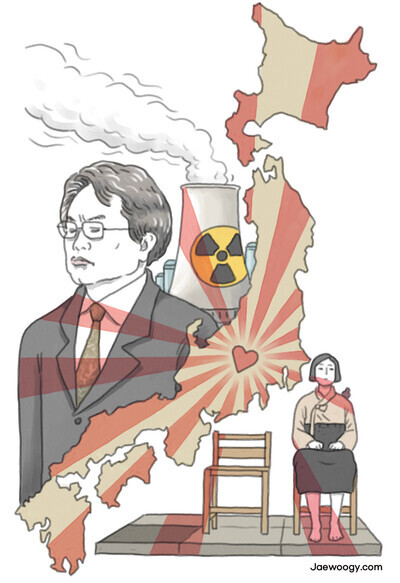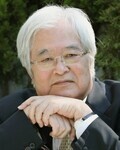hankyoreh
Links to other country sites 다른 나라 사이트 링크
[Column] How Japan attempts to erase its shameful history

Around this time two years ago, I wrote a column titled “The Self-Deception of a War Criminal Nation,” in which I criticized the lack of reflection in Japan at a national level. I talked about how Japan refused to acknowledge its historical error, sidestepping responsibility for its crimes in a war it had started by painting itself as the victim of atomic bombings that happened while it was finally surrendering to the US.
It’s a perspective that I picked up from remarks by the veteran journalist Choi Jeong-ho. Later on, I was more mindful of Japan’s attitude toward South Korea, in order to take responsibility for what I’d written.
But that perspective has shifted. I now think it needs to be emphasized all the more. Again and again, we’ve seen how Japan not only isn’t reflecting but is working hard to try to expunge its shameful history.
It vehemently opposes the raising of statues in the US and Germany to commemorate victims of wartime sexual slavery while failing to see the universal human sorrow that the victims experienced with their fate of serving as “comfort women.” Instead, it has sought to erase the evidence, viewing these things as mere condemnation of its past misdeeds.
Next, there were the issues raised over designating Gunkanjima (Hashima Island) as a UNESCO World Heritage site.
Countries everywhere — including the UK and US, both countries that pride themselves on human rights — have been expressing their shame over the abuse of child labor and violence against indigenous populations in the eras of development and exploration. They have clearly acknowledged and even compensated for their misdeeds.
The Japanese, in contrast, have taken pride in the development of Gunkanjima. Refusing to acknowledge the suffering and forced labor inflicted on colonial subjects there, they have sought to whitewash their own history, avoiding any documentation of it despite UNESCO recommendations.
After a South Korean court ruled to order a Japanese company to compensate conscripted Korean workers, Japan took retaliatory action by restricting its companies’ exports of certain components to South Korea. While there are all sorts of opinions that factor into the application of a court ruling among countries, the decision to take a judicial issue and turn it into a matter of economic retaliation is deplorable.
After that, we saw Japan openly opposing US efforts to include South Korea in an expanded G7 summit. In the process, they parted ways with the Asian system of being “good neighbors” and submitting to the powerful — seeking instead to hold on to its lofty bragging rights as a hegemon within the “Greater East Asia Co-Prosperity Sphere.”
It should have been punished for its war crimes during World War II, but it avoided responsibility by presenting itself as the “victim” in the war because of the atomic bombs dropped on it.
Under the protection of the US, it became a logistics base for the US military during the Korean War in the 1950s and the Vietnam War in the 1960s. It did not just recover in the postwar era — it grew enormously, becoming the world’s second-richest country. Even so, it appears anxious about being unable to keep South Korea or its development down.
Finally, we arrive at the remarks made by Hirohisa Soma, which were so outrageously extreme in their right-wing views that they make one question his character as a diplomat and the very stature of the country he represents.
At this point, I began asking whether Japan’s overreaching when it comes to South Korea stems from a complex over the strides made by a country that it once called a colony. It may have concluded that South Korea has yet to match Japan across the board, but it can also see how we have been gaining on it over the past 60 years — and how we can even pride ourselves on having overtaken it in certain respects.
In 1980, individual income in South Korea was one-sixth of the level in Japan. Today, it is over US$30,000, compared with a little over US$40,000 in Japan.
In the automobile industry that Japan takes so much pride in, South Korea is hot on its heels in the US and Southeast Asia; in the 21st-century industries of semiconductors and batteries, South Korea leads by a sizable margin.
They must be feeling astonished and envious — and frightened — at South Korea’s vigorous growth, which resulted in it being unanimously recognized as a “developed economy” by the UN Conference on Trade and Development.
My ideas were confirmed by a book titled “Japan and the Shackles of the Past” by the US scholar R. Taggart Murphy. Having been born during Japan’s colonization of Korea, I had not yet shaken off by feelings of its superiority — but this book clearly spells out how Japan is being challenged by South Korea today.
“Great electronics conglomerates [. . .] have been left in the dust by the Korean giant Samsung,” the book reads, adding that South Korean businesses have also been overwhelming Japan in areas ranging from consumer appliances to popular culture.
Noting the arrival of a new generation of IT companies in the US, the book notes three ways in which South Korea holds an advantage: a more globalized elite, political and economic institutions with “much clearer power structures and far more obvious accountability, with the concomitant benefits of quick and decisive decision-making,” and a “lack of margin for error” due to inter-Korean antagonism and the existential threat of North Korea.
As a professor at the University of Tsukuba, Murphy appears quite knowledgeable about Japan. He applies the Orwellian doublespeak of the concepts of “tatemae” (outward behavior) and “honne” (true feelings) to Japan’s decline, quoting the words of the political philosopher Masao Maruyama, who criticized the Japanese war criminals for having “acted like reluctant, passive victims, dragged into a catastrophe that had not been of their making.”
The difference between appearances and true feelings resulted in a refusal to take responsibility, and that lack of responsibility has diluted any reflection or criticism, making even the idea of revolution unimaginable.
Over the course of several revolutions, quasi-revolutions, and regime changes, South Korea has made great strides in terms of its public, its political economy, and its society and culture to become what it is today.
Meanwhile, Japan, in retrospect, remains caught up in its “Galapagos syndrome”: boasting of its “unbroken line of emperors,” it has spent the six decades or so since the Second World War living under a one-party state not much different from China’s, with the Liberal Democratic Party at its helm.
Its three-way separation of powers — a symbolic emperor, a Cabinet divided up according to lineage, and a stubborn bureaucracy — results in a situation where everyone passes the buck when it comes to new policy decisions and responsibility for the outcomes.
I do agree with Murphy’s trenchant observation after witnessing Japan’s small country temperament: the way it has yet to escape from the “American embrace,” the way it continues taking its cues from Washington and shrinking away at summits despite being one of the world’s three richest nations. Having ironically achieved modernization through revivalism and reinforcement of the monarchy with the Meiji Restoration, he notes, Japan since 1945 has been busy trying to conceal the institutional flaws of the 1930s rather than fixing them.
When he writes that the Koreans have responded far better to globalization than Japan, that is not just a matter of a US scholar offering flattery for the sake of “tatemae.” All of that lethargy, irresponsibility, and unreflectiveness were on display once again at the 2020 Summer Olympics, which took place in the sweltering heat of the 2021 summer.
Japan had won the bid for one of the largest events in the world, yet the person behind that bid was absent from the opening ceremony, and the emperor could not share his congratulations. Yet no one demands or assumes responsibility for the decision to go ahead with the competition without spectators amid scorching August temperatures and a state of emergency with the Delta variant of the COVID-19 virus.
I saw a diminished Japan at the closing ceremony, which showed no signs of any vision for the world or the future.
I hope South Korea is not tainted by the kind of structure of political irresponsibility that has persisted under Japan’s long de facto one-party system. I take pride in the way South Korea stands ahead of Japan in terms of policy choices under its two-party system — and in terms of taking responsibility for them.

By Kim Byung-ik, culture columnist
Please direct comments or questions to [english@hani.co.kr]

Editorial・opinion
![[Column] Season 2 of special prosecutor probe may be coming to Korea soon [Column] Season 2 of special prosecutor probe may be coming to Korea soon](https://flexible.img.hani.co.kr/flexible/normal/500/300/imgdb/original/2024/0426/3317141030699447.jpg) [Column] Season 2 of special prosecutor probe may be coming to Korea soon
[Column] Season 2 of special prosecutor probe may be coming to Korea soon![[Column] Park Geun-hye déjà vu in Yoon Suk-yeol [Column] Park Geun-hye déjà vu in Yoon Suk-yeol](https://flexible.img.hani.co.kr/flexible/normal/500/300/imgdb/original/2024/0424/651713945113788.jpg) [Column] Park Geun-hye déjà vu in Yoon Suk-yeol
[Column] Park Geun-hye déjà vu in Yoon Suk-yeol- [Editorial] New weight of N. Korea’s nuclear threats makes dialogue all the more urgent
- [Guest essay] The real reason Korea’s new right wants to dub Rhee a founding father
- [Column] ‘Choson’: Is it time we start referring to N. Korea in its own terms?
- [Editorial] Japan’s rewriting of history with Korea has gone too far
- [Column] The president’s questionable capacity for dialogue
- [Column] Are chaebol firms just pizza pies for families to divvy up as they please?
- [Column] Has Korea, too, crossed the Rubicon on China?
- [Correspondent’s column] In Japan’s alliance with US, echoes of its past alliances with UK
Most viewed articles
- 1AI is catching up with humans at a ‘shocking’ rate
- 2After election rout, Yoon’s left with 3 choices for dealing with the opposition
- 3Is Japan about to snatch control of Line messenger from Korea’s Naver?
- 4South Korea officially an aged society just 17 years after becoming aging society
- 51 in 5 unwed Korean women want child-free life, study shows
- 6[Column] ‘Choson’: Is it time we start referring to N. Korea in its own terms?
- 7Korea’s 1.3% growth in Q1 signals ‘textbook’ return to growth, says government
- 8No good, very bad game for Korea puts it out of Olympics for first time since 1988
- 9[Editorial] Japan’s rewriting of history with Korea has gone too far
- 10Why Korea shouldn’t welcome Japan’s newly beefed up defense cooperation with US